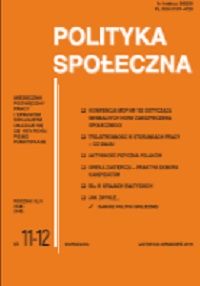
- Assessment of Poland's implementation of the provisions of ILO Convention No. 102 concerning minimum social security standards (1-8)
The article discusses International Labor Organization standards in the field of social security, mainly ILO Convention No. 102 on minimum social security standards. The text presents an assessment of Poland's implementation of this most important convention in the field of social security, and the conclusions drawn from this assessment.
- Trilateral sources are drying up. Some remarks on the centenary of the International Labor Organization (8-14)
The article contains reflections related to the centenary of the International Labor Organization. The decreasing strength of employee representation was indicated, which has consequences in the scope of ILOP standard-making activities. The content of the ILO Declaration for the future of work is being analyzed. The question poses the question of whether due to the decrease in the power of employee representation in trilaterality, one can see the basic source of the ILO's special legitimacy.
- Physical activity as a manifestation of meeting social needs in Poland (15-22)
The needs of household members are varied. They include not only elementary needs, but also higher ones, including social ones. The latter are defined as the needs of social coexistence, such as socialization, building external and internal social bonds, physical culture, recreation. The purpose of the article is to show the important role of physical activity in the hierarchy of household needs in the context of the aging and losing health condition of the Polish society. Therefore, attention was paid to the specificity of the examined needs and possibilities of satisfying them, emphasizing the role of social infrastructure. The health condition of the society from the perspective of demographic changes and approach to health problems was also presented. The latest CSO household budget surveys were used, showing expenditure on recreation and culture, as well as the results of the latest edition of the EU-SILC 2017 survey, from which information on the state of physical activity in Poland was obtained.
- Standards and dysfunctions in the selection process of candidates for foster parents (23-27)
Helping families with problems in fulfilling the caring and educational function is the responsibility of the commune. It is about supporting such families and, above all, fulfilling our obligations towards children and exercising their rights. Diagnosis of the difficult situation of families may result in a decision on the need to place the child outside of it, i.e. in a foster family. The effectiveness of caring activities will depend on the proper selection of people, i.e. foster parents, who will voluntarily take responsibility for the child's upbringing process, ensuring its full development. The aim of the article is to analyze and evaluate the selection process of candidates for foster parents. The presented content, prepared on the basis of literature and research results as well as own research (participant observation), prove dysfunctional reality in the sphere of foster care in the country.
- Professional activity of people aged 50+ in the Baltic States (Estonia, Lithuania, Latvia) in 1998-2017 (27-34)
In most countries around the world the problem of population aging can be seen. Due to this phenomenon, new policies are being implemented, in the development of which additional factors, not only demographic but also cultural, are taken into account. Their goal is primarily to increase the activation of people of working age. More and more people receive social benefits, which are financed from the pay-as-you-go part of contributions paid by employees, and the number of professionally active people decreases. This is caused not only by the retirement of people from the baby boomers generation, but also by a gradual decrease in the number of births, which in the long term will affect the labor market by a smaller number of people of working age. In addition, reforms aimed at, among others, delaying in many countries around the world increasing the retirement age. The aim of the article is to present the situation of the elderly (over 50) on the labor market in the Baltic States (Estonia, Lithuania and Latvia). The author verified the hypothesis that the motivation to extend professional activity depends on the conditions of the pension system, i.e. the possibility of early retirement and bonuses for longer seniority. The article uses a critical analysis of the literature on the subject and measures of descriptive statistics. Comparative analysis was also used. The sources of empirical data are statistical offices of individual countries, as well as Eurostat and OECD.
Polityka Społeczna (Social Policy) - full list







